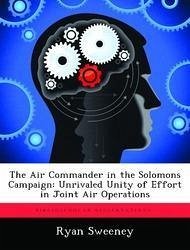The Solomon Islands air command and control structure was unique in history. The Commander, Air Forces Solomons (COMAIRSOLS) rotated periodically between military services, and was in charge of all expeditionary Marine, Navy, and Army Air forces on the islands. Although the operation is the best example of joint air effort, not only in the war, but for 50 years thereafter, there is little literature on the distinct command structure, its influence on operations, and how leaders overcame service rivalries, despite the intense interservice debates of that era. The thesis first focuses on the senior leaders in the South Pacific. They set the organizational construct, chose joint air leaders, and provided tremendous leadership and support to these subordinate commanders. The three Solomon air commanders appearing in this study were selected because they led the operation at pivotal moments during the campaign. Their charisma and courage were as important to the success of the campaign as was the organizational structure itself. Without the right people in Solomon air leader positions, the results of the campaign may have been in question. Together this team of air leaders was crucial in turning the tide in the Pacific War, and showed that, even in a time of intense interservice rivalry, if the right person is in command, the service they belong to does not matter. Leaders tend to put aside interservice rivalry in matters of survival, and the more they distance themselves from political air power debates, the easier it is to ensure success of air operations.
Hinweis: Dieser Artikel kann nur an eine deutsche Lieferadresse ausgeliefert werden.
Hinweis: Dieser Artikel kann nur an eine deutsche Lieferadresse ausgeliefert werden.








